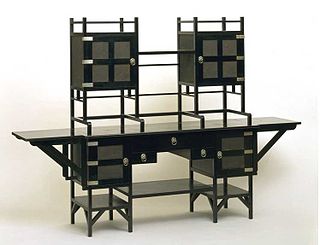This page is based on this
Wikipedia article Text is available under the
CC BY-SA 4.0 license; additional terms may apply.
Images, videos and audio are available under their respective licenses.

Blackjack is the American variant of a globally popular banking game known as Twenty-One, whose cousins include Pontoon and Vingt-et-Un. It is a comparing card game between usually several players and a dealer, where each player in turn competes against the dealer, but players do not play against each other. It is played with one or more decks of 52 cards, and is the most widely played casino banking game in the world. The objective of the game is to beat the dealer in one of the following ways:
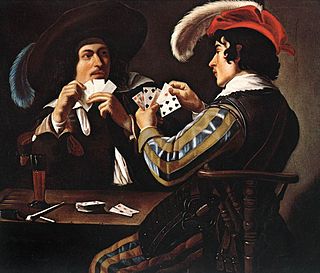
A card game is any game using playing cards as the primary device with which the game is played, be they traditional or game-specific. Countless card games exist, including families of related games. A small number of card games played with traditional decks have formally standardized rules, but most are folk games whose rules vary by region, culture, and person. Games using playing cards exploit the fact that cards are individually identifiable from one side only, so that each player knows only the cards he holds and not those held by anyone else. For this reason card games are often characterized as games of chance or “imperfect information”—as distinct from games of strategy or “perfect information,” where the current position is fully visible to all players throughout the game.

Magic: The Gathering is both a trading card and digital collectible card game created by Richard Garfield. Released in 1993 by Wizards of the Coast, Magic was the first trading card game to gain widespread acceptance and it continues to thrive, with approximately twenty million players as of 2015, and over twenty billion Magic cards produced in the period of 2008 to 2016 alone.
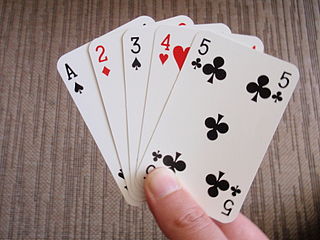
A playing card is a piece of specially prepared heavy paper, thin cardboard, plastic-coated paper, cotton-paper blend, or thin plastic, marked with distinguishing motifs and used as one of a set for playing card games. Playing cards are typically palm-sized for convenient handling, and were first invented in China during the Tang dynasty.

The DCI is the official sanctioning body for competitive play in Magic: The Gathering and various other games produced by Wizards of the Coast and its subsidiaries, such as Avalon Hill. The DCI provides game rules, tournament operating procedures, and other materials to private tournament organizers and players. It also operates a judge certification program to provide consistent rules enforcement and promote fair play.
A Game of Thrones: The Card Game is an out-of-print collectible card game produced by Fantasy Flight Games. It is based on A Song of Ice and Fire, a series of novels written by George R. R. Martin. The first set was Westeros Edition and was released in August 2002. It has since won two Origins Awards. The game's primary designer is Eric Lang, the lead developer is Nate French, with Damon Stone serving as associate designer.
The Odyssey is a Magic: The Gathering expert-level block. It consists of a trio of expansion sets: Odyssey, Torment and Judgment.

A Game of Thrones is a strategy board game created by Christian T. Petersen and released by Fantasy Flight Games in 2003. The game is based on the A Song of Ice and Fire fantasy series by George R. R. Martin. It was followed in 2004 by the expansion A Clash of Kings, and in 2006 by the expansion A Storm of Swords.
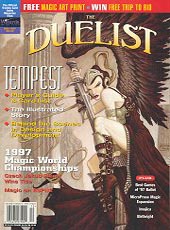
The Duelist was a trading card game magazine published by Wizards of the Coast.

Horserace is a drinking game using playing cards that is inspired by horse racing. Participants bet amounts of alcohol on one of four aces, much like bettors would bet money on horses at a racing track. The game requires a standard deck of playing cards.
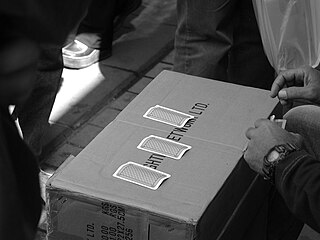
Three-card Monte – also known as Find the Lady and Three-card Trick – is a confidence game in which the victim, or "mark", is tricked into betting a sum of money, on the assumption that they can find the "money card" among three face-down playing cards. It is the same as the shell game except that cards are used instead of shells.
Magic: The Gathering formats are various ways in which the Magic: The Gathering collectible card game can be played. Each format provides rules for deck construction and gameplay, with many confining the pool of permitted cards to those released in a specified group of Magic card sets. The DCI, the governing body that oversees official Magic competitive play, categorizes its tournament formats into Constructed and Limited.
House of Cards may refer to:
Magic: The Gathering is a game with detailed and, at times, complex rules. Knowledge of the game's rules is necessary to play the game.
The Urza Block is a Magic: The Gathering block centered on the exploits of Urza Argive. It consists of the expansions Urza's Saga, Urza's Legacy and Urza's Destiny.

Playing cards were most likely invented in China during the Southern Song dynasty (1127–1279). They were certainly in existence by the Mongol Yuan dynasty (1271-1368). Chinese use the word pái (牌), meaning "plaque", to refer to both playing cards and tiles. Many early sources are ambiguous if they don't specifically refer to paper pái (cards) or bone pái (tiles). In terms of game play, there is no difference; both serve to hide one face from the other players with identical backs. Card games are examples of imperfect information games as opposed to Chess or Go.
